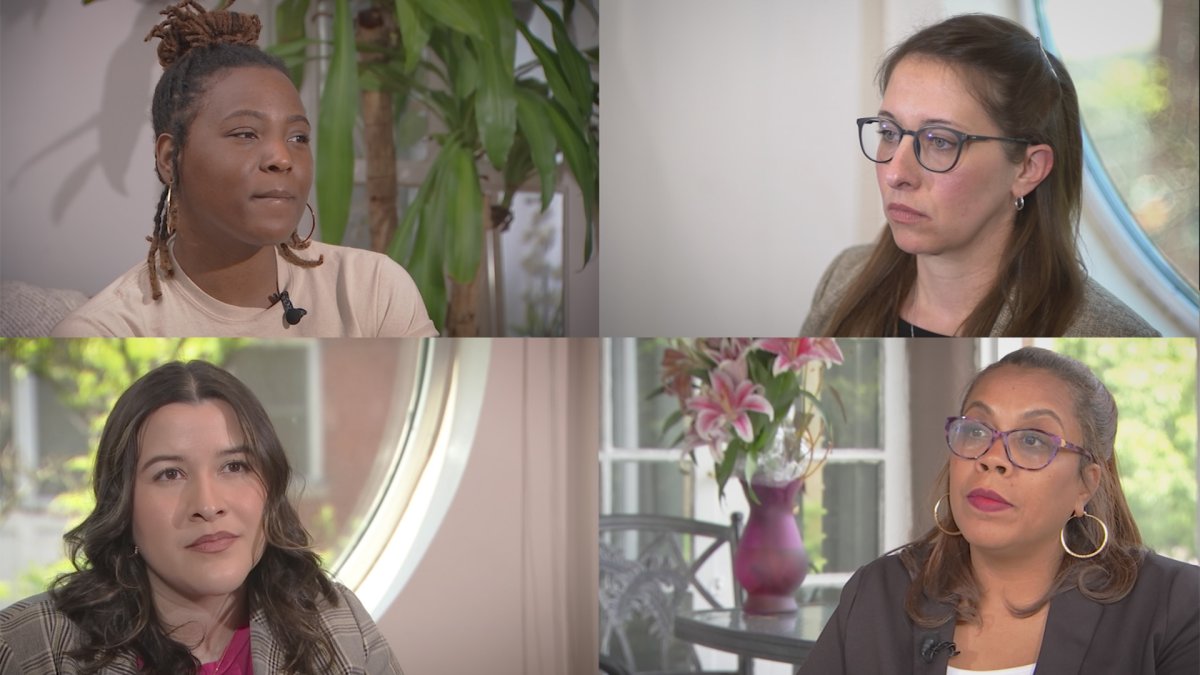
As the Supreme Court appears poised to overturn Roe v. Wade, four women who had abortions spoke to NBC10 about their life experiences. NBC10 photojournalist Jason Ryan interviewed the women from diverse backgrounds about how they came to make their decisions, and how they feel about abortion rights now. Two support the right to an abortion, and now work with Planned Parenthood, and two now oppose the right to an abortion. Hear from Marlene Downing, deputy state director of the Susan B. Anthony List; Jalani Brown, a mother from Philadelphia; Lindsey Mauldin, vice president, advocacy and public policy, Planned Parenthood of Southeastern PA; and Signe Espinoza, executive director of the Planned Parenthood PAC.
Judy Ward, a state senator from rural Pennsylvania, believes abortion should only be allowed in "rare circumstances."
Those cases include when a pregnant woman's life is in danger, and possibly for cases of rape and incest.
"I don't think you have a right to take a life of another. These are certainly humans," Ward, a registered nurse, said in an interview with NBC10 on Tuesday, noting that she believes life begins at conception.
"People get upset about animals, puppies and cats, being put down, but what about humans? They are so worried about animals, but not about humans."
Get top local stories in Philly delivered to you every morning. Sign up for NBC Philadelphia's News Headlines newsletter.
Ward is one of the leading opponents of abortion in Pennsylvania's state Legislature. Last November, she introduced a bill that could eventually lead to a ballot question asking voters if the Pennsylvania Constitution should be amended to ban abortions and outlaw state funding for abortion procedures.
Ward's legislation has yet to get a vote in the Senate committee where it must be approved before the full Senate holds a vote on it. But its lack of progress could change in the coming weeks after a draft ruling by the U.S. Supreme Court overturning Roe v. Wade emerged on Tuesday.
Ward represents a rural swath of Pennsylvania west of Harrisburg and stretching from the Maryland border to near State College. The first-term senator, seeking re-election this year, previously served two terms in the state House of Representatives.
A former colleague of Ward's in the state House, Rep. Donna Oberlander, has introduced identical legislation. Both chambers of the General Assembly would have to approve the legislation in consecutive years before it can be put to voters as a ballot question in an election.
That could happen as soon as November 2023 if the bills introduced by Ward and Oberlander get approved this year and early next year. A spokeswoman for Oberlander said the lawmaker was not available to talk Tuesday.
Ward said her stance comes from her mother.
"It probably originates from a strong spiritual upbringing. But more than that, I see it as morally wrong," Ward said. "And you know, if my mother had not been pro-life, I wouldn't be in the Senate fighting for the lives of the unborn."
"People get upset about animals, puppies and cats, being put down, but what about humans? They are so worried about animals, but not about humans."
Pennsylvania state Sen. Judy Ward
Pennsylvania's Abortion Control Act currently allows abortions to be performed on a woman up to 24 weeks pregnant.
The constitutional amendment banning abortion in the state Constitution that Ward and Oberlander are proposing would not immediately put an end to abortions in Pennsylvania. But it would set the groundwork for future legislation that does.
But such legislation remains unconstitutional while the 1973 Supreme Court ruling Roe v. Wade remains in place.
Abortion rights supporters argue that Roe v. Wade is a precedent that should not be overturned by the current Supreme Court because women should be able to choose for themselves what to do with their bodies.
"I come from a space where I was the policy director for Planned Parenthood. I have seen all of the bills come up in the past that are coming up again," Democratic state Sen. Amanda Cappelletti said in an interview with NBC10.
She said abortion law in Pennsylvania could eventually limit the procedure to women pregnant six weeks or less, and ban abortions in cases like fetal diagnoses of severe Down syndrome.
Cappelletti said that this year's elections in Pennsylvania are now all the more important to abortion rights supporters.
If Roe v. Wade is overturned, a Republican governor and a Republican-majority legislature could ban abortions in Pennsylvania. The 2022 election in Pennsylvania includes the race for governor, with current Democratic Gov. Tom Wolf unable to run again because of term limits.
Democrat Josh Shapiro, the state's attorney general, is the Democratic nominee who will be on the ballot for governor in November. He faces no opponents in the May 17 primary. Shapiro said Tuesday that he would veto any legislation that bans abortion in Pennsylvania.
Seven Republicans are vying for their party's nomination. There has been no indication from any of the candidates that they would veto legislation banning abortion.
Roe v. Wade Stories
Ward said she hopes Roe v. Wade is overturned to put the decision-making about abortions back in the hands of state legislators like her and her colleagues.
And it's a misconception that only male lawmakers support abortion bans, she said.
"I would say, the majority of the women in the Senate are extremely pro-life, Republican women lawmakers, that is," Ward said. "If Roe is overturned and it comes back to the states, it's up to the states to determine the law. Legislators should be deciding this. We're the ones elected to make the laws."
NBC10 reporter Lauren Mayk contributed reporting to this story.

